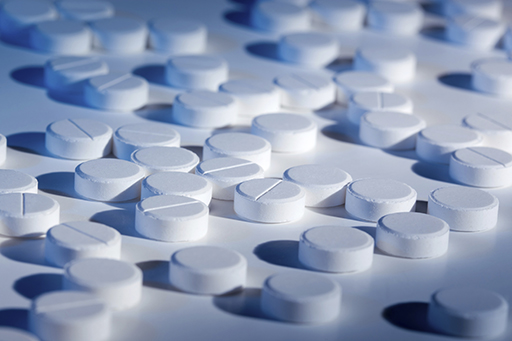Clinical

Clinical briefing: Aspirin and cancer
In Clinical
Let’s get clinical. Follow the links below to find out more about the latest clinical insight in community pharmacy.Bookmark
Record learning outcomes
A growing body of evidence is suggesting that aspirin reduces the risk of certain cancers and may even offer a new adjunctive treatment, writes PM's clinical editor

Cancer is, slowly, yielding its secrets, but one promising approach to prevent and treat it is already in most homes across the UK. I’m talking about aspirin.
Gastro-oesophageal reflux, for instance, seems to be the main cause of oesophageal adenocarcinoma. Proton pump inhibitors (PPIs) reduce acid reflux and, in people with the premalignant condition Barrett’s oesophagus, inhibit cyclo-oxygenase-2 (COX-2).1 Aspirin also inhibits COX-2, so the AspECT study assessed whether combining aspirin and PPIs prevented oesophageal cancer in people with Barrett’s oesophagus.
AspECT enrolled 2,557 patients from the UK and Canada who showed Barrett’s oesophagus of at least 1cm. Roughly equal numbers received high-dose (40mg twice daily) or low-dose (20mg once daily) esomeprazole, with or without aspirin (300mg daily in the UK, 325mg a day in Canada). Researchers followed patients for a median of 8.9 years. The study used a composite endpoint of time to all-cause mortality, oesophageal adenocarcinoma or high-grade dysplasia.1
Overall, the 24 per cent difference in the time to the composite endpoint between those taking and not taking aspirin was not statistically significant but the authors also analysed the relationship before patients started using non-steroidal antiinflammatory drugs (NSAIDs).
In this analysis, aspirin was 29 per cent more effective, which was statistically significant. Combining highdose esomeprazole with aspirin increased the time to the composite endpoint by 59 per cent compared with low-dose PPI without aspirin.
Similar story
It is a similar story in ovarian cancer, a malignancy that seems to be intimately linked to inflammation. For instance, the more ovulatory cycles a woman has (which can trigger localised inflammation), the greater her ovarian cancer risk. Women with high levels of C-reactive protein, which indicates systemic inflammation, are about twice as likely to develop ovarian cancer as those with low levels.2
Several studies suggest that aspirin may reduce ovarian cancer risk. During a 10.8-year follow-up of 758,829 women, those who used aspirin on six or more days a week were 10 per cent less likely to develop ovarian cancer compared with infrequent or non-users. On the other hand, daily paracetamol use increased the risk by 28 per cent overall and by 70 per cent for serous ovarian cancer.3
Another recent study reported that women who regularly used low-dose aspirin (100mg a day or less) were 23 per cent less likely to develop ovarian cancer than non-users. Standard-dose (325mg) aspirin was associated with a 17 per cent increased risk, which was not statistically significant. Notably, some actions of lowdose aspirin, such as the effects on platelets, differ from those at high doses. Regularly using NSAIDs was associated with a significant 19 per cent increase in risk compared with non-users.
After diagnosis
Aspirin may also benefit patients after they’ve been diagnosed with cancer. A meta-analysis of 29 studies reported that taking aspirin after the diagnosis of colorectal cancer reduces deaths from this malignancy by 28 per cent. Based on 14 and 16 studies, taking aspirin reduces mortality from breast and prostate cancer by 31 and 13 per cent respectively. Aspirin reduced the risk of metastases by 21 or 69 per cent, based on five and four studies respectively.4
Not all recent studies have been as promising. Diabetes seems to increase cancer risk by about 10 per cent, again partly driven by inflammation.5 The ASCEND study involved 15,480 adults with diabetes but free from cardiovascular disease who received 100mg aspirin daily or placebo.
During a mean follow-up of 7.4 years, serious vascular events, including ischaemic stroke or myocardial infarctions, were 12 per cent less common in the aspirin group compared with placebo (8.5 and 9.6 per cent respectively). Major bleeding was, however, 29 per cent more common (4.1 and 3.2 per cent respectively). “The absolute benefits were largely counterbalanced by the bleeding hazard,” the authors comment.6
Several meta-analyses suggested that aspirin (predominately at low doses) may reduce the incidence of malignancies or death from cancer by 15 to 20 per cent. The risk of gastrointestinal malignancies (especially colorectal cancer) declined by 30 to 40 per cent. In these studies, aspirin’s benefits emerged after about three years but ASCEND showed no difference between the aspirin and placebo groups for all malignancies (11.6 and 11.5 per cent respectively) and gastrointestinal tract cancer (2.0 per cent in both groups).
The analyses, however, “had limited statistical power to detect” a difference in cancer rates, so the researchers will follow patients for longer.6
It could just be a matter of time before aspirin’s anticancer potential becomes a subject of discussion with patients.

 It is a similar story in ovarian cancer, a malignancy that seems to be intimately linked to inflammation. For instance, the more ovulatory cycles a woman has (which can trigger localised inflammation), the greater her ovarian cancer risk. Women with high levels of C-reactive protein, which indicates systemic inflammation, are about twice as likely to develop ovarian cancer as those with low levels.2
It is a similar story in ovarian cancer, a malignancy that seems to be intimately linked to inflammation. For instance, the more ovulatory cycles a woman has (which can trigger localised inflammation), the greater her ovarian cancer risk. Women with high levels of C-reactive protein, which indicates systemic inflammation, are about twice as likely to develop ovarian cancer as those with low levels.2